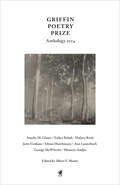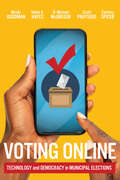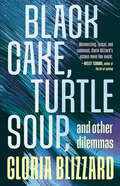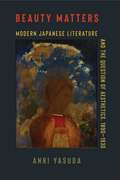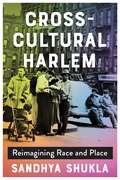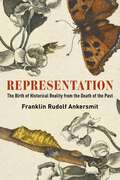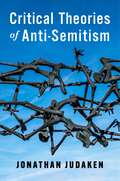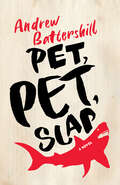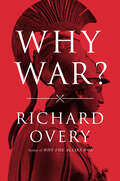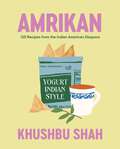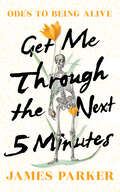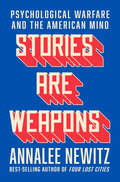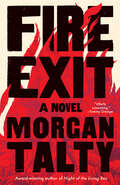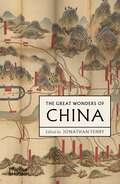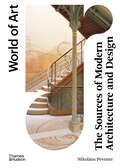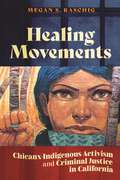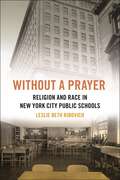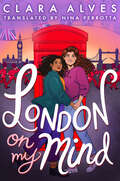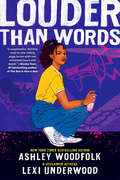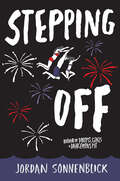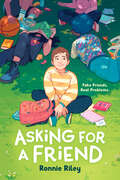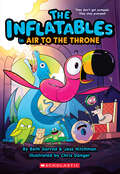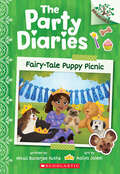- Table View
- List View
Kiss the Undertow: A Novel
by Marie-Hélène LarochelleThe water slurps my shoulders, torso, and back in a big, wet kiss, bending my image into an ironic clone of the truth. I bow to its dominance and let it break me open. The water alone will have me. Watched obsessively by her guru-like coach, a nameless swimmer battles the element of water in a gruelling physical regimen. Outside of training, she floats loose in waters murky, salty, and chlorinated, engaging in aimless self-destruction, restraint looming just beyond her drifting hand. Incrementally, swimming is killing her; the pool is killing her. Hovering always nearby is a prickly vulture, waiting to feed on the swimmer’s remains … Intense and immersive, Kiss the Undertow is a psychologically gripping account of endurance pushed to extremes.
Griffin Poetry Prize Anthology 2024: A Selection of the Shortlist (The Griffin Poetry Prize Anthology)
by Nicole Lambe Edited by Albert F. MoritzThe prestigious and highly anticipated annual anthology of the best poetry in English from the shortlist of the 2024 Griffin Poetry Prize. Each year, the best books of poetry published in English are honoured with the Griffin Poetry Prize, one of the world’s most prestigious and richest literary awards. Since 2001, this annual prize has tremendously spurred interest in and recognition of poetry, focusing worldwide attention on the formidable talent of poets writing in English and works in translation. Annually, The Griffin Poetry Prize Anthology features the work of the extraordinary poets shortlisted for the awards and introduces us to some of the finest poems in their collections.
Voting Online: Technology and Democracy in Municipal Elections (McGill-Queen's Studies in Urban Governance)
by Zachary Spicer Scott Pruysers Nicole Goodman R. Michael McGregor Helen A. HayesIn an attempt to reverse declining rates of voter participation, governments around the world are turning to electronic voting to improve the efficiency of vote counts, and increase the accessibility and equity of the voting process for electors who may face additional barriers. The Covid-19 pandemic has intensified this trend.Voting Online focuses on Canada, where the technology has been widely embraced by municipal governments with one of the highest rates of use in the world. In the age of cyber elections, Canada is the only country where governments offer fully remote electronic elections and where traditional paper voting is eliminated for entire electorates. Municipalities are the laboratories of electoral modernization when it comes to digital voting reform. We know conspicuously little about the effects of these changes, particularly the elimination of paper ballots.Relying on surveys of voters, non-voters, and candidates in twenty Ontario cities, and a survey of administrators across the province of Ontario, Voting Online provides a holistic view of electronic elections unavailable anywhere else.
Black Cake, Turtle Soup, and Other Dilemmas: Essays
by Gloria BlizzardA diasporic collection of essays on music, memory, and motion.In this powerful and deeply personal collection, Gloria Blizzard uses traditional narrative essays, hybrid structures, and the tools of poetry to negotiate the complexities of culture, geography, and language in an international diasporic quest.These essays of wayfinding accompany anyone exploring issues of belonging — to a family, a neighbourhood, a group, or a country. Here, the small is profound, the intimate universal; the questions are all relevant and the answers of our times require simultaneous multiple perspectives.
Beauty Matters: Modern Japanese Literature and the Question of Aesthetics, 1890–1930 (Studies of the Weatherhead East Asian Institute, Columbia University)
by Anri YasudaThe notion of beauty is inherently elusive: aesthetic judgments are at once subjective and felt to be universally valid. In Beauty Matters, Anri Yasuda demonstrates that by exploring the often conflicting yet powerful pull of aesthetic sentiments, major authors of the late Meiji (1868–1912) and Taishō (1912–1926) periods illuminated themes and perspectives that resonated broadly in modern Japanese society. This approach presents an alternative to conventional accounts in which Japanese literature before the modernist turn of the 1920s has tended to be defined by an insular focus on subjective representation and autobiographical realism.Yasuda investigates how Natsume Sōseki, Mori Ogai, Mushanokōji Saneatsu and his peers at Shirakaba magazine, and Akutagawa Ryūnosuke sought to identify the aesthetic properties of literature through comparisons with the visual arts. They also considered the position of Japanese cultural sensibilities within the Eurocentric imperial world order. Their stories featuring painters and paintings weigh the fundamental challenge of representing anything when the conditions of knowledge are in flux, and their stories about cross-cultural encounters display both hope and ambivalence about the prospect of cosmopolitanism. Yasuda shows how thinking about beauty and art enabled these authors to surpass purely “literary” concerns. By tracing the wide-reaching significance of aesthetic affect in literary thought, Beauty Matters destabilizes received conceptions of literature’s parameters and affirms literature’s continued potential to intervene in cultural discourses in Japan and beyond.
Cross-Cultural Harlem: Reimagining Race and Place
by Sandhya ShuklaOver the course of the twentieth and twenty-first centuries, Harlem has been the capital of both Black America and a global African diaspora, an early home for Italian and Jewish immigrant communities, an important Puerto Rican neighborhood, and a representative site of gentrification. How do we understand the power of a place with so many claims and identifications? Drawing on fiction, sociology, political speech, autobiography, and performance, Sandhya Shukla develops a living theory of Harlem, in which peoples of different backgrounds collide, interact, and borrow from each other, even while Blackness remains crucial.Cross-Cultural Harlem reveals a dynamic of exchange that provokes a rethinking of spaces such as Black Harlem, El Barrio, and Italian Harlem. Cross-cultural encounters among African Americans, West Indians, Puerto Ricans, Jews, and Italians provide a story of multiplicity that challenges the framework of territorial enclaves. Shukla illuminates the historical processes that have shaped the diversity of Harlem, examining the many dimensions of its Blackness—Southern, African, Caribbean, Puerto Rican, and more—as well as how white ethnicities have been constructed. Considering literary and historical examples such as Langston Hughes’s short story “Spanish Blood,” the career of the Italian American left-wing Harlem congressman Vito Marcantonio, and the autobiography of Puerto Rican–Cuban writer Piri Thomas, Shukla argues that cosmopolitanism and racial belonging need not be seen as contradictory. Cross-Cultural Harlem offers a vision of sustained dialogue to respond to the challenges of urban transformations and to affirm the future of Harlem as actual place and global symbol.
Representation: The Birth of Historical Reality from the Death of the Past (Columbia Themes in Philosophy)
by Franklin Rudolf AnkersmitWhat makes historical writing distinctive? In Representation, Franklin Rudolf Ankersmit—the preeminent figure in the philosophy of history today—offers a deeply original way of understanding the practice of historical writing and a powerful vindication of history as an empirical discipline. Based on a new reading of the philosophy of G. W. Leibniz, Ankersmit constructs a rigorous framework for understanding the nature of historical argument.Representation argues that while previous states of affairs have left evidence that can be used to formulate true statements, the past itself is irretrievably lost. A condition of historical writing is that the past as such does not exist. Historical texts are best understood as complex signs that mutually criticize one another to compose a historical reality fundamentally distinct from common-sense notions of the past.Representation casts an entirely new light on fundamental concepts such as historical truth, historical debate, and historical rationality. Cogent, forceful, and provocative, this book is the most ambitious work in the philosophy of history in many years.
Critical Theories of Anti-Semitism (New Directions in Critical Theory #86)
by Jonathan JudakenDespite its persistence and viciousness, anti-Semitism remains undertheorized in comparison with other forms of racism and discrimination. How should anti-Semitism be defined? What are its underlying causes? Why do anti-Semites target Jews? In what ways has Judeophobia changed over time? What are the continuities and disconnects between medieval anti-Judaism and the Holocaust? How does criticism of the state of Israel relate to anti-Semitism? And how can social theory illuminate the upsurge in attacks on Jews today?Considering these questions and many more, this book is at once a philosophical reflection on key problems in the analysis of anti-Semitism and a history of its leading theories and theorists. Jonathan Judaken explores the methodological and conceptual issues that have vexed the study of Judeophobia and calls for a reconsideration of the definitions, categories, and narratives that underpin overarching explanations. He traces how a range of thinkers have wrestled with these challenges, examining the theories of Jean-Paul Sartre, the Frankfurt School, Hannah Arendt, and Jean-François Lyotard, alongside the works of sociologists Talcott Parsons and Zygmunt Bauman and historians Léon Poliakov and George Mosse. Judaken argues against claims about the uniqueness of Judeophobia, demonstrating how it is entangled with other racisms: Islamophobia, Negrophobia, and xenophobia. Critical Theories of Anti-Semitism not only urges readers to question how they think about Judeophobia but also draws them into conversation with a range of leading thinkers whose insights are sorely needed in this perilous moment.
Pet, Pet, Slap
by Andrew BattershillRocky meets Elmore Leonard meets Miranda July as Pillow Wilson, a past-his-prime boxer, trains for his last title shot. Shenanigans ensue.Having recently undergone an ethical awakening, Pillow has converted to veganism and is in the middle of trying to rehome his menagerie of exotic pets (including Jersey Joe the sloth and Rigoberto the shark) in humane animal shelters. His roommate, Sherlock Holmes, has recently faked his own death by waterfall, and has now gone incognito and is Pillow’s in-house doping expert.The thing is, Pillow doesn’t feel all that motivated to train for his next big fight, and he’s further distracted from his training when his car and pet shark mysteriously disappear. Luckily, Sherlock is a master of deduction. What follows is part underdog sports story, part work of Neozoological Surrealism, and part existential mystery novel."Reckless, desperate, and achingly human, Battershill remains funnier than anyone else on your shelf." – Andrew F. Sullivan, author of The Marigold"The adventures of Battershill’s returning protagonist Pillow are witty and occasionally absurd, but the story never trips on ironies. Battershill twines the humanity of pulp noir with the unsettling play of surrealism to build a world in which pet sloths, Sherlock Holmes, and skilled drug pushers all seem to have found their ideal home." – Naben Ruthnum, author of A Hero of Our Time"Pillow Wilson is one of my favourite characters in CanLit, and he is in fine form in Pet, Pet, Slap, a deeply funny, inventive, bizarre, heartbreaker of a book. Andrew Battershill not only writes with that magical alchemy of humour and pathos that most writers only wish they could pull off, but he somehow also balances surrealism and profound humanity in a way I’m sure I’ll spend the rest of my life trying to figure out. I haven’t had this much fun reading in a long, long time." – Amy Jones, author of Pebble & Dove
Why War?
by Richard OveryWhy has war been such a consistent presence throughout the human past? A leading historian explains, drawing on rich examples and keen insight. Richard Overy is not the first scholar to take up the title question. In 1931, at the request of the League of Nations, Albert Einstein asked Sigmund Freud to collaborate on a short work examining whether there was “a way of delivering mankind from the menace of war.” Published the next year as a pamphlet entitled Why War?, it conveyed Freud’s conclusion that the “death drive” made any deliverance impossible—the psychological impulse to destruction was universal in the animal kingdom. The global wars of the later 1930s and 1940s seemed ample evidence of the dismal conclusion. A preeminent historian of those wars, Overy brings vast knowledge to the title question and years of experience unraveling the knotted motivations of war. His approach is to separate the major drivers and motivations, and consider the ways each has contributed to organized conflict. They range from the impulses embedded in human biology and psychology, to the incentives to conflict developed through cultural evolution, to competition for resources—conflicts stirred by the passions of belief, the effects of ecological stresses, the drive for power in leaders and nations, and the search for security. The discussions show remarkable range, delving deep into the Neolithic past, through the twentieth-century world wars, and up to the current conflict in Ukraine. The examples are absorbing, from the Roman Empire’s voracious appetite for resources to the impulse to power evident in Alexander the Great, Napoleon, and Hitler. The conclusion is not hopeful, but Overy’s book is a gift to readers: a compact, judicious, engrossing examination of a fundamental question.
Old King: A Novel
by Maxim LoskutoffIn this haunting novel about the end of the frontier dream, a man tries to reinvent himself in one of America’s last wild territories, while his neighbor begins a crime spree that will tremble the nation. In the summer of 1976, Duane Oshun finds himself stranded in a remote Montana town beset by a series of strange and menacing events. He takes a job as a logger and builds a cabin on an isolated road near a reclusive neighbor—a hermit named Ted Kaczynski. The two men are captivated by the valley’s endangered old-growth forest, but Kaczynski’s violent grievances against modern society soon threaten the lives of all those around him. As Kaczynski’s bombs crescendo to the book’s devastating conclusion, Old King wrestles with the birth of the modern environmental movement, the accelerating dominion of technology in American life, and a new kind of violence that lives next door. Told in four parts sweeping across two decades, Old King establishes Maxim Loskutoff as one of the most thrilling and inventive authors of the American west, a writer “endowed with fearless audacity, stunning grace, and gutsy heart” (Nickolas Butler).
Amrikan: 125 Recipes from the Indian American Diaspora
by Khushbu Shah“What is Indian food in America?” In her eagerly anticipated debut cookbook, acclaimed food writer Khushbu Shah injects an electric and irresistible energy into the story of Indian food, with 125 recipes inspired by the cooking of the diaspora. From the savory and bold flavors of Achari Paneer Pizza to the ultimate home-cooked comfort meal, a pot of Spinach Tadka Dal with rice, Khushbu’s recipes are flavor-packed, party-pleasing, and wonderfully surprising. She invites readers on a journey far beyond butter chicken (though she has a stellar recipe for it), offering instructions for preparing meals, drinks, and desserts as diverse as Saag Paneer Lasagna, Classic Dosas, Keralan Fried Chicken Sandwiches, Pani Puri Mojitos, and a Masala Chai Basque Cheesecake. Khushbu makes it easy to dive in, equipping home cooks with a list of simple-to-find pantry staples alongside vibrant images, clever tips and tricks, and illuminating essays that introduce a thrilling voice in American food.
Get Me Through the Next Five Minutes: Odes to Being Alive
by James Parker"Parker is articulate and provocative, seeing the poetry in the ordinary and the wonderful in the world." —Kirkus Reviews (starred review) "Parker offers some loose advice for living (give money to panhandlers whole-heartedly, because doing so means participating in ‘the same divine economy that big-banged you into being’), but is at his best when poring over life’s strange resonances…pays vivid homage to the beauty of the mundane." —Publishers Weekly (starred review) From the vertiginously talented James Parker, a collection of uproarious odes that show how to find gratitude in unexpected places. Our politics are broken; our world is melting; the next catastrophe looms. Enter James Parker, who for years now has been writing odes of appreciation on subjects from the seemingly minor (“Ode to Naps”) to the unexpected (“Ode to Giving People Money”) to the seemingly minor, unexpected, and hyperspecific (“Ode to Running in Movies”). Finally collecting Parker’s beloved and much-lauded odes in one place, this volume demonstrates the profound power of the form. Each ode is an exercise in gratitude. Each celebrates the permanent susceptibility of everyday humdrum life to dazzling saturations of divine light: the squirrel in the street, the crying baby, the misplaced cup of tea. Parker’s odes are songs of praise, but with a decent amount of complaining in there, too: a human ratio of moans. Varied in length but unified in tone, mostly in prose, sometimes toppling into verse, the odes range across music, movies, literature, psychology, and beyond, all through the lens of Parker’s personal history. Gathered together, they form an accidental how-to guide to honoring your own experience—and to finding your own odes.
Stories Are Weapons: Psychological Warfare and the American Mind
by Annalee NewitzOne of Publishers Weekly's Top 10 Politics/Current Events books of Spring 2024 A sharp and timely exploration of the dark art of manipulation through weaponized storytelling, from the best-selling author of Four Lost Cities. In Stories Are Weapons, best-selling author Annalee Newitz traces the way disinformation, propaganda, and violent threats—the essential tool kit for psychological warfare—have evolved from military weapons deployed against foreign adversaries into tools in domestic culture wars. Newitz delves into America’s deep-rooted history with psychological operations, beginning with Benjamin Franklin’s Revolutionary War–era fake newspaper and nineteenth-century wars on Indigenous nations, and reaching its apotheosis with the Cold War and twenty-first-century influence campaigns online. America’s secret weapon has long been coercive storytelling. And there’s a reason for that: operatives who shaped modern psychological warfare drew on their experiences as science fiction writers and in the advertising industry. Now, through a weapons-transfer program long unacknowledged, psyops have found their way into the hands of culture warriors, transforming democratic debates into toxic wars over American identity. Newitz zeroes in on conflicts over race and intelligence, school board fights over LGBT students, and campaigns against feminist viewpoints, revealing how, in each case, specific groups of Americans are singled out and treated as enemies of the state. Crucially, Newitz delivers a powerful counternarrative, speaking with the researchers and activists who are outlining a pathway to achieving psychological disarmament and cultural peace. Incisive and essential, Stories are Weapons reveals how our minds have been turned into blood-soaked battlegrounds—and how we can put down our weapons to build something better.
Fire Exit: A Novel
by Morgan Talty“Spellbinding.”—TIME, A Best Book of Summer “Utterly consuming. . . . Fire Exit absolutely smolders.”—Tommy Orange The blood that came out of me was blood that ran through her veins. It’s strange: all bloodlooks the same, yet it’s different, we’re told, in so many various ways and for so many various reasons. But one thing is for certain, I thought: you are who you are, even if you don’t know it. From the porch of his home, Charles Lamosway has watched the life he might have had unfold across the river on Maine’s Penobscot Reservation. On the far bank, he caught brief moments of his neighbor Elizabeth’s life—from the day she came home from the hospital to her early twenties. But there’s always been something deeper and more dangerous than the river that divides him from her and the rest of the tribal community. It’s the secret that Elizabeth is his daughter, a secret Charles is no longer willing to keep. Now, it’s been weeks since he’s seen Elizabeth, and Charles is worried. As he attempts to hold on to and care for what he can—his home and property; his alcoholic, quick-tempered, and bighearted friend Bobby; and his mother, Louise, who is slipping ever deeper into dementia— he becomes increasingly haunted by his past. Forced to confront a lost childhood on the reservation, a love affair cut short, and the death of his beloved stepfather, Fredrick, in a hunting accident—a death he and Louise are at odds over as to where to lay blame—Charles contends with questions he’s long been afraid to ask. Is his secret about Elizabeth his to share? And would his daughter want to know the truth, even if it could cost her everything she’s ever known? From the award-winning author of Night of the Living Rez, Morgan Talty’s debut novel, Fire Exit, is a masterful and unforgettable story of family, legacy, bloodlines, culture and inheritance, and what, if anything, we owe one another.
The Great Wonders of China
by Jonathan FenbyThe magnificent wonders of China, ancient and modern, revealed by an international team of leading scholars. China is the oldest continuous civilization on earth and holds a unique global place in the twenty-first century. The Great Wonders of China’s wide focus shows what makes China such a special country, with topics stretching from the natural wonders, including mountains and rivers, to the Silk Road; the technological innovations of printing and the compass; and the modern, vibrant cities of today as well as famous monuments, such as the Forbidden City in Beijing and the Great Wall. In this new and updated paperback edition, a team of leading scholars from Asia and the West provide a compelling history of China. Beyond the quality of the individual entries, The Great Wonders of China provides a chronicle of Chinese history and culture as well as helping readers understand and appreciate this vast country.
The Sources of Modern Architecture and Design (World of Art #0)
by Nikolaus PevsnerAn updated edition of this classic survey of the origins of twentieth-century ideas in architecture and the applied arts. The turn of the nineteenth century saw an extraordinary flowering of invention in architecture and design, leading to the emergence of two contrasting styles: art nouveau and the International Style. Professor Nikolaus Pevsner brings clarity to this period of dynamic change by tracing the origins of twentieth-century ideas in architecture and the applied arts. Featuring a new foreword by the distinguished architectural historian Kenneth Frampton, The Sources of Modern Architecture and Design has now been updated with color illustrations throughout.
Healing Movements: Chicanx-Indigenous Activism and Criminal Justice in California
by Megan S. RaschigHow a grassroots abolitionist project of cultural healing counters the carceral state in a Chicanx community in CaliforniaFor many, gang involvement can be a guaranteed life sentence, a force which traps them in an inescapable cycle of violence even if it does not lead to actual prison time. Healing Movements explores the work of formerly gang-involved Chicanx men and women in California who draw on the social connections made during their gang-involved years to forge new pathways for cultural healing and countering the carceral system.Known colloquially as the “movement of healing,” this Chicanx-Indigenous abolitionist project based in Salinas, California, was spurred on by a series of four police homicides of Latino men in 2014. Organizing around such issues as police brutality and mass incarceration, these collectives—two of which are discussed in this book, one mixed-gender, and the other women-only—turned to their often obscured Mesoamerican ancestry to find new resources for building a different future for themselves and subsequent generations.Drawing on extensive fieldwork conducted in Salinas, Healing Movements reveals how these communities have taken shape in large part through a conscious effort to uplift Chicanx-Indigenous culture and ceremonial practices. By tapping into their Indigeneity, the members of these collectives access a wealth of new resources to shape their future, opening up novel ways to organize and build strong relational ties that are noteworthy to anyone invested in abolitionist work.
Without a Prayer: Religion and Race in New York City Public Schools (North American Religions #24)
by Leslie Beth RibovichReframes religion’s role in twentieth-century American public educationThe processes of secularization and desegregation were among the two most radical transformations of the American public school system in all its history. Many regard the 1962 and 1963 US Supreme Court rulings against school prayer and Bible-reading as the end of religion in public schools. Likewise, the 1954 Brown v. Board of Education case is seen as the dawn of school racial equality. Yet, these two major twentieth-century American educational movements are often perceived as having no bearing on one another.Without a Prayer redefines secularization and desegregation as intrinsically linked. Using New York City as a window into a national story, the volume argues that these rulings failed to successfully remove religion from public schools, because it was worked into the foundation of the public education structure, especially how public schools treated race and moral formation. Moreover, even public schools that were not legally segregated nonetheless remained racially segregated in part because public schools rooted moral lessons in an invented tradition—Judeo-Christianity—and in whiteness.The book illuminates how both secularization and desegregation took the form of inculcating students into white Christian norms as part of their project of shaping them into citizens. Schools and religious and civic constituents worked together to promote programs such as juvenile delinquency prevention, moral and spiritual values curricula, and racial integration advocacy. At the same time, religiously and racially diverse community members drew on, resisted, and reimagined public school morality.Drawing on research from a number of archival repositories, newspaper and legal databases, andvisual and material culture, Without a Prayer shows how religion and racial discrimination were woven into the very fabric of public schools, continuing to inform public education’s everyday practices even after the Supreme Court rulings.
London On My Mind
by Clara AlvesRed, White & Royal Blue meets A Cuban Girl's Guide to Tea and Tomorrow in this unlikely London romance by debut author Clara Alves!Sixteen-year-old Dayana has always dreamed of visiting London -- to walk along the Thames, take pictures outside Buckingham Palace, and maybe even get a glimpse of Arthur, Prince of Wales, whose marriage has been all over tabloids. But the trip of her dreams turns into a royal nightmare when her mother passes away. Now, Day must leave Rio de Janeiro to live with her estranged father and his new family in London.As it turns out, the U.K. isn't exactly Day's cup of tea. She struggles to forgive her father for walking out on her and her mom all those years ago; fights with her stepsister constantly; detests her stepmother; and she can't even see One Direction in concert because they've been broken up for ages. All she wants to do is trade the rainy skies of London for the sun and beaches of Rio.That's when she runs into the girl of her dreams -- literally: The coincidentally named Diana, a witty, funny, redhead who was in the middle of . . . escaping Buckingham Palace? Something isn't right here, but it makes Diana all the more alluring. As time passes, and the two girls grow closer, Day can't help but wonder if there is more than a little truth to the rumors surrounding Prince Arthur -- and if Diana might be involved somehow. Is it all in her head, or could Day be caught up in a real-life royal scandal?
Louder Than Words
by Ashley Woodfolk Lexi UnderwoodThis amazing collaboration brings together two inspirational Black artists, NYT bestselling author Ashley Woodfolk and actress Lexi Underwood, for a story about the transformative power of art as protest and its capacity to change the world.When Jordyn Jones transfers to Edgewood High, it's her opportunity to forget everything that happened at her old school. To forget what she and her friends did. To forget who she used to be. That was a different person — this is a fresh start. Now she's someone new, someone better.Except it's the very first day of school, and somehow everyone already seems to know who she is. But Jordyn soon finds a group of friends, and she even starts talking to Izaiah, a soccer star who shares her love of art. Life is good. That's until an anonymous podcast called Tomcat Tea begins revealing humiliating secrets about Edgewood students, ruining their reputations and in some cases their futures. Jordyn and her friends know they have to do something—and this is Jordyn's chance to prove to herself that she's changed.Jordyn's plan to take down the podcast throws her into the spotlight, and as the momentum builds, so do the risks—because Jordyn has a secret of her own, one that could ruin everything . . . and that a mysterious harasser online is threatening to expose.With riveting prose, New York Times bestselling author Ashley Woodfolk and acclaimed actress Lexi Underwood balance an insightful depiction of the power of art as protest with asking some of the biggest questions facing teenagers today—in an era where mistakes can be picked over endlessly online, who is worthy of forgiveness? Can someone ever really change?
Stepping Off
by Jordan SonnenblickJesse Dienstag's favorite sweatshirt says, "The real world isn't real." That's the slogan of the vacation-home community in Pennsylvania where his family has always spent every vacation and weekend for as long as he can remember. In the summer of 2019, as Jesse is about to enter his junior year of high school in New York City, he desperately wants to believe the slogan is true. For one thing, the two girls he loves -- equally and desperately -- are in Pennsylvania, and all the stresses and pressures of his daily life and school are in New York.But when his parents stop talking to each other, it gets harder and harder for Jesse to maintain his dream life in Pennsylvania. And when Covid shuts New York City down in March 2020 just days after Jesse’s mother leaves his father, Jesse's worlds collide.
Asking for a Friend
by Ronnie RileyEden Jones has exactly three friends. And they're all fake.From a web of lies and social anxiety to true friendship and queer joy; this is the wonderful second book from the author of the Indies Introduce and Indie Next List pick, Jude Saves the World.Why go through the stress of making friends when you can just pretend? It works for Eden and their social anxiety... until their mom announces she's throwing them a birthday party and all their friends are invited.Eden's "friends," Duke, Ramona, and Tabitha, are all real kids from school... but Eden's never actually spoken to them before. Now Eden will do whatever it takes to convince them to be their friends--at least until the party is over.When things start to go better than Eden expects, and the group starts to bond, Eden finds themselves trapped in a lie that gets worse the longer they keep it up. What happens if their now sort-of-real friends discover that Eden hasn't been honest with them from the very beginning?Author Ronnie Riley creates a world full of queer joy and all the ups and downs of true friendship.
The Inflatables in Air to the Throne (The Inflatables)
by Beth Garrod Jess HitchmanThe Inflatables don't get pumped. They stay pumped! Inflata-pals and bouncy BFFs Cactus, Flamingo, Donut, and Watermelon are ready for a fresh wave of drama in this hilariously action-packed graphic novel series that’s perfect for fans of Dog Man and The Bad Guys!When an Airy Frogfather grants Flamingo’s wish for a fancy new home for his inflata-pals, he's pumped! But to claim the palace, the gang will have to go up against Sir-Spits-A-Lot, an evil inflatable llama who won't give up the castle easily. Will Flamingo have what it takes to survive llamagedon and become the rightful air to the throne?
Fairy-Tale Puppy Picnic: A Branches Book (The Party Diaries)
by Mitali Banerjee RuthsPriya puts together the perfect puppy picnic and raises money to help African wild dogs, in the fourth installment of this full-color early chapter book series!Pick a book. Grow a Reader!This series is part of Scholastic's early chapter book line, Branches, aimed at newly independent readers. With easy-to-read text, high-interest content, fast-paced plots, and illustrations on every page, these books will boost reading confidence and stamina. Branches books help readers grow!Priya is planning a puppy picnic for her friend Dola! It has a fairy-tale theme because Dola's adorable puppy is named Prince! Priya starts her party-prep to-do list. She makes castle invitations, creates DIY crowns, and bakes cupcakes (and pupcakes!). But as the puppy picnic gets closer, it looks like it might rain. Priya tries not to worry, but the weather is not something she can check off her to-do list. Will she have to cancel the picnic?With color-coded speech bubbles, an engaging diary format, plenty of humor, and vibrant artwork on every page, this series is perfect for newly independent readers! There's even a fun DIY activity at the back of the book, encouraging kids to make their own fabric ribbon garland at home!

